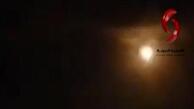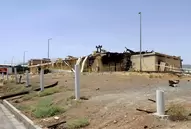6 july 2020
New York Times that contrary to the Iranian government's initial statement that it was an accident, a "powerful bomb" caused Thursday's fire.
Israel has worked to disrupt Iran's nuclear programme in the past, including the Stuxnet cyberattack in 2010, which targeted Iran's nuclear centrifuges and was blamed on Israel and the US.
A member of Iran's powerful Islamic Revolutionary Guard Corps told the Times that authorities had ruled out the possibility of a cyberattack, while the country's Civil Defence Organisation said authorities were looking at possible sabotage following recent blasts at several key Iranian sites.
Following the fire at the Natanz nuclear facility, a fire broke out at a power station in the country's southwest, and a chlorine gas leak occurred at a unit of the Karoon petrochemical plant near the port of Bandar Imam Khomeini on the Gulf, injuring dozens.
On 26 June, there was an explosion near the Parchin military and weapons development base, east of Tehran. Authorities said it was caused by a leak in a gas storage facility in an area outside the base.
"Considering we are in a serious economic war with the United States and we have conflicts in various fields, the first hypothesis is that these accidents could be a threat and caused by the enemy's moves," General Gholam Reza Jalali, the head of Iran's Civil Defence Organisation, said on Friday.
Hostile acts by "anti-revolutionary elements" were also a possibility, he said, referring to domestic opposition groups.
The Middle Eastern intelligence official told The Times, on condition of anonymity, that Israel was behind the Natanz blast but not any of the other incidents.
Hours before Iranian authorities announced the fire, a mysterious group calling itself the "Homeland Panthers" claimed responsibility for the attack in a series of emails sent to BBC Persian journalists.
The group told the BBC that the attack was carried out by elements within Iran's security forces.
Leiberman calls to gag official
In Israel, former Defence Minister Avigdor Leiberman appeared to call out Mossad chief Yossi Cohen for leaking Israel's alleged role in the blast to the press.
While not naming Cohen, Lieberman said: "everyone knows who that intelligence official is".
"I expect the prime minister to shut the [leaker’s] mouth, particularly as he has started his Likud primary election campaign,” Leiberman added. Cohen has been mentioned as a possible successor to Netanyahu.
"It just cannot be that that official not only explains what we did, but also what we didn't do."
Iran announced last year it would progressively suspend certain commitments made under a 2015 nuclear deal that the US walked away from in 2018.
One of those commitments was to put on hold its activities at Natanz. Tehran restarted enriching uranium at the nuclear facility in September.
The incident at the Natanz site comes just a few months ahead of the expiry date on a United Nations arms embargo on Iran, of which both the US and Israel are lobbying the UN Security Council to extend.
Israel has worked to disrupt Iran's nuclear programme in the past, including the Stuxnet cyberattack in 2010, which targeted Iran's nuclear centrifuges and was blamed on Israel and the US.
A member of Iran's powerful Islamic Revolutionary Guard Corps told the Times that authorities had ruled out the possibility of a cyberattack, while the country's Civil Defence Organisation said authorities were looking at possible sabotage following recent blasts at several key Iranian sites.
Following the fire at the Natanz nuclear facility, a fire broke out at a power station in the country's southwest, and a chlorine gas leak occurred at a unit of the Karoon petrochemical plant near the port of Bandar Imam Khomeini on the Gulf, injuring dozens.
On 26 June, there was an explosion near the Parchin military and weapons development base, east of Tehran. Authorities said it was caused by a leak in a gas storage facility in an area outside the base.
"Considering we are in a serious economic war with the United States and we have conflicts in various fields, the first hypothesis is that these accidents could be a threat and caused by the enemy's moves," General Gholam Reza Jalali, the head of Iran's Civil Defence Organisation, said on Friday.
Hostile acts by "anti-revolutionary elements" were also a possibility, he said, referring to domestic opposition groups.
The Middle Eastern intelligence official told The Times, on condition of anonymity, that Israel was behind the Natanz blast but not any of the other incidents.
Hours before Iranian authorities announced the fire, a mysterious group calling itself the "Homeland Panthers" claimed responsibility for the attack in a series of emails sent to BBC Persian journalists.
The group told the BBC that the attack was carried out by elements within Iran's security forces.
Leiberman calls to gag official
In Israel, former Defence Minister Avigdor Leiberman appeared to call out Mossad chief Yossi Cohen for leaking Israel's alleged role in the blast to the press.
While not naming Cohen, Lieberman said: "everyone knows who that intelligence official is".
"I expect the prime minister to shut the [leaker’s] mouth, particularly as he has started his Likud primary election campaign,” Leiberman added. Cohen has been mentioned as a possible successor to Netanyahu.
"It just cannot be that that official not only explains what we did, but also what we didn't do."
Iran announced last year it would progressively suspend certain commitments made under a 2015 nuclear deal that the US walked away from in 2018.
One of those commitments was to put on hold its activities at Natanz. Tehran restarted enriching uranium at the nuclear facility in September.
The incident at the Natanz site comes just a few months ahead of the expiry date on a United Nations arms embargo on Iran, of which both the US and Israel are lobbying the UN Security Council to extend.
7 june 2020

Syrian Observatory for Human Rights says the attack targeted Iran-backed militias near the city of Deir ez-Zur and the victims are militiamen from Iraq and Afghanistan, who 3 days ago received a fresh supply of arms and ammunition
At least 12 people have been killed in an alleged Israeli air strike on Iranian targets in eastern Syria, a war-monitoring group reported Sunday.
The Syrian Observatory for Human Rights said the attack, which allegedly targeted pro-Iranian militias, took place on a night between Saturday and Sunday and was carried out near the city of Deir ez-Zur.
The watchdog said the victims are Iran-backed militiamen from Iraq and Afghanistan and several arms depots were destroyed in the attack.
Recent reports indicated the militias received a fresh supply of arms and ammunition three days ago.
A week ago, an "unknown aircraft" also reported to have struck targets belonging to pro-Iranian targets, in Al Bukamal in eastern Syria near the border with Iraq, killing at least five militiamen.
According to some reports, during the attack a fighter jet struck military vehicles, belonging to Iran-backed militias, carrying heavy machine guns.
Surprisingly, however, Syrian did not put the blame for that attack on Israel, like it usually does following similar incidents.
At least 12 people have been killed in an alleged Israeli air strike on Iranian targets in eastern Syria, a war-monitoring group reported Sunday.
The Syrian Observatory for Human Rights said the attack, which allegedly targeted pro-Iranian militias, took place on a night between Saturday and Sunday and was carried out near the city of Deir ez-Zur.
The watchdog said the victims are Iran-backed militiamen from Iraq and Afghanistan and several arms depots were destroyed in the attack.
Recent reports indicated the militias received a fresh supply of arms and ammunition three days ago.
A week ago, an "unknown aircraft" also reported to have struck targets belonging to pro-Iranian targets, in Al Bukamal in eastern Syria near the border with Iraq, killing at least five militiamen.
According to some reports, during the attack a fighter jet struck military vehicles, belonging to Iran-backed militias, carrying heavy machine guns.
Surprisingly, however, Syrian did not put the blame for that attack on Israel, like it usually does following similar incidents.

